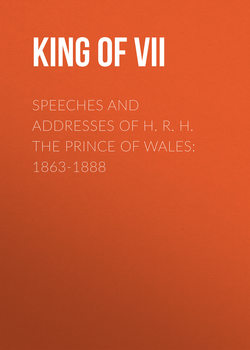Читать книгу Speeches and Addresses of H. R. H. the Prince of Wales: 1863-1888 - King of Great Britain Edward VII - Страница 1
PREFACE
ОглавлениеThe year 1888, that of the Silver Wedding of the Prince and Princess of Wales, is also the 25th anniversary of the year when the Prince first began to appear in public life. It is, therefore, a fit time to present some record of events in which His Royal Highness has taken part, and of services rendered by him to the nation, during the past quarter of a century. The best and the least formal way of doing this seemed to be the reproduction of his Speeches and Addresses, along with some account of the occasions when they were delivered.
Some of these speeches, in more recent years, are known to all, and their importance is universally recognised; such as those relating to the various International Exhibitions, the foundation of the Royal College of Music, and the establishment of the Imperial Institute. But throughout the whole of the twenty-five years, there has been a succession of speeches, on all manner of occasions, of many of which there is no adequate record or remembrance. It is only due to the Prince to recall the various services thus rendered by him, especially during those earlier years when the loss of the Prince Consort was most deeply felt, and when the Queen, whose Jubilee has been so splendidly celebrated, was living in retirement. A new generation has come on the stage since those days, and there are comparatively few who remember the number and variety of occasions upon which Royalty was worthily represented by the Prince of Wales, and the important and arduous duties voluntarily and cheerfully undertaken by him.
Before carrying out this design, it was advisable to ascertain if there might be any objection on the part of the Prince of Wales. There might, for instance, be a purpose of official publication of these speeches. On the matter being referred to the Prince, he not only made no objection, but, in most kind and gracious terms, gave his sanction to the work, and hoped it might be "useful to the various objects which he had publicly advocated and supported."
The number and diversity of occasions on which the Prince has made these public appearances will surprise those who have not personal recollection of them. The speeches themselves will surprise no one. The Prince has had education and culture such as few of any station obtain; directed at first by such a father as the Prince Consort, and by tutors who carried out the design of both his parents. Accomplished in Art, and interested in Science, in Antiquities, and most branches of learning; with some University training at Oxford, Cambridge, and Edinburgh, and with his mind enlarged by foreign travel, we might expect the fruits of such training to appear in his public addresses. Add to this the kindliness which comes from a good natural disposition, the sympathetic influence of a genial manner, and the grace which is given by a training from childhood in the highest station, and we can understand how the speeches even of the earliest years were heard with pleasure and approval. Some of the speeches are very brief, but are always to the point, and present the gist of the subject in hand. It was Earl Granville who once said, in proposing his health, that, "if the speeches of His Royal Highness were usually short, they were always, to use a homely expression, as full of meat as an egg." Even where there has been no formal speech, we are interested in knowing what the Prince has done as well as what he has said; and therefore some important occasions are included when no speech was made.
It is the variety of subjects that will strike most readers. Let it be noted, moreover, that the speeches now reproduced are only those addressed to meetings where reporters for the press were present. There have been innumerable meetings besides, – meetings of Commissions, of Boards, of Councils, of Committees, at none of which has the Prince ever been an inactive or silent member, but rather the guiding and moving spirit. If the voluntary offices of His Royal Highness were printed at length, they would far outnumber those mere honorary titles with which the College of Arms concerns itself; and are such as imply thought and work, in many useful and beneficent ways.
Long may His Royal Highness have the health and the will for such offices and duties. If his future career is equal to the hopes and promise of his early life, and the performances1 of the last twenty-five years, he will leave a name illustrious and memorable in the history of the British Empire.
1
The frontispiece portrait, under which the Prince of Wales has been pleased to put his autograph, is etched by W. Strang, from a recent photograph by Van der Weyde
